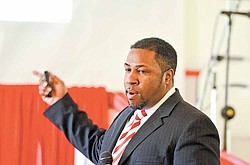Experience caused awakening for Harding High graduate
The Vindicator (Youngstown)
Yusuf Johnson of Cleveland, a Warren native and Harding High School graduate, told an audience at Beulah Baptist Church on the South Side on Sunday about the events that awoke him to the negative images that encourage young blacks to adopt unhealthy lifestyles.
By Ed Runyan
YOUNGSTOWN
Yusuf Johnson of Cleveland, a Warren native and Harding High School graduate, says life for black Americans is a lot like the 1999 movie “The Matrix,” in which everyone’s destiny is controlled by an unseen force.
Johnson told an audience at the South Side Beulah Baptist Church on Sherwood Avenue on Sunday that his eyes were opened to that force one day while walking through the Richmond Mall in suburban Cleveland and seeing a hip-hop booth with belt buckles made to look like a “gun with bling on it.”
Johnson asked the man running the booth if he would sell that same sort of merchandise in Solon or any of the areas with lower black populations, and the man asked him “Who are you?”
Also at that mall, he noticed a T-shirt for sale showing a black man wearing flashy jewelry with his finger to his lips and the words “Stop Snitchin’.”
Johnson asked the owner of that store, a Korean, whether he would allow his children to wear it, and the owner said no.
Johnson said the belt buckles and T-shirts, which he says are sold in stores and malls that cater to blacks everywhere, are like that unseen force in the Matrix.
“We don’t see it. We become accustomed to it,” Johnson said of images and clothing that reinforce images of black Americans in negative ways.
Johnson said the belt buckles opened his eyes to that force, similar to a character from “The Matrix” who took a red pill that allowed him to wake up from his ignorance.
Since then, he’s been noticing the prevalence of such products and images and confronting the people responsible for them. He also has a web site — www.sellingusshort.com — where he encourages people to report such locations so that Johnson can write them a letter.
“When we see the images and are not doing anything about it, we’re confirming it,” Johnson said. “We should get upset about it. We should ask for college shirts. You need to raise a voice. You need to say something.
“Gangster and drug shirts are everywhere,” Johnson said. “It’s hard to find a T-shirt depicting a college.”
Johnson’s talk, which he provokingly called “Acting Black,” also focused on some of the other influences in society that tell black kids to act in unhealthy ways, such as hip-hop celebrities who talk about living in the “hood,” when they could be living in a nicer area with a nicer home.
Living in a nice neighborhood “isn’t acting white. It’s having a nice life for himself,” Johnson said.
“Acting black could also mean cooperating with police,” Johnson said, getting an education, being a billionaire on the front cover of Forbes magazine, being the CEO of Xerox like Ursula Burns or being an astro physicist like Neil deGrasse Tyson.
One young woman in the audience said she was upset once when she saw child-sized jail outfits for sale in a Youngstown-area store and then saw several of them on children.
Johnson said he sees too many children who he would call “thugs in training,” who are wearing braids, earrings and are “totally blinged out.”
“What we’re telling them [the child] is the cool is first. We’ll learn to read later,” Johnson said.
Among the habits that seem most harmful to blacks, Johnson said, is neck tattoos, which he believes give employers one more reason not to hire.
Another is condoning the practice of littering in the streets and neighborhoods.
“Acting black should not be trash. I get frustrated when I see that. When we see somebody throwing trash, it shouldn’t be uncool to say ‘Hey, man. Pick that up.’”
As for the use of a derogatory term for a black person, Johnson said such terms were created to describe Vietnamese during the War in Vietnam and Germans during World War II.
Such terms are “another way to separate the humanity” while killing an enemy, Johnson said, adding that he’s talking mainly about use of the term by blacks. A dehumanizing term for blacks was created for the same reason, “and it should be gone,” Johnson said.
Johnson said he doesn’t understand why some black restaurant workers in Cleveland think providing poor customer service is OK.
“When I get bad customer service, I call the manager and I complain,” he said.
The way the Japanese people have responded to the challenges they’ve faced in recent weeks because of the earthquake and tsunami have shown the world their dignity.
Faced with long lines for supplies, they were seen waiting patiently.
“You learn a lot by how people handle tragedy,” Johnson said. By contrast, he showed images of looting that took place in the U.S. South after Hurricane Katrina.
“The world sees this,” Johnson said.
 43
43

